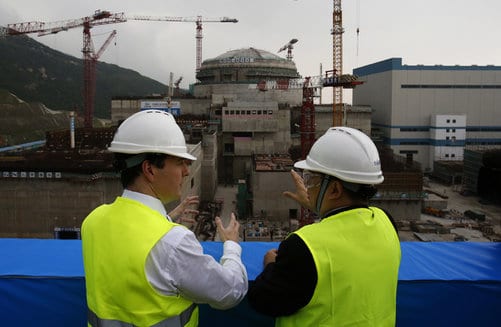
The chancellor of the exchequer, George Osborne, has recently been waving huge wads of cash at different (but similarly delinquent) parts of UK nuclear policy. In August, he sailed triumphantly up the Clyde to the Trident-hosting Faslane Naval base to announce £500m of investment. This was a move many considered to be jumping the gun, or even “arrogant” given that no final decision has been made on its renewal.
A few weeks later, on his tour of China, Osborne was announcing an astonishing £2 billion loan guarantee to city investors if the developers of the Hinkley C reactor go bust. And this is additional to a guaranteed strike price of £92.50 per megawatt hour for 35 years (roughly double the current price of electricity – and significantly more than the current strike price for several renewables). As Simon Jenkins writes in relation to the chancellor’s recent announcements: “You can accuse George Osborne of many things, but austerity isn’t one of them”.
No laughing matter
It has got to the point with Hinkley C where one must wonder how Osborne, the secretary of state for Energy and Climate Change, Amber Rudd and the chief executive of EDF, Vincent de Rivaz, manage to keep straight faces while repeating what a good deal the project will be for everybody. The French state-owned energy firm EDF is due to partner with the Chinese under the deal announced by Osborne in Beijing, and Rivaz’s boss, Jean-Bernard Levy, has admitted that the Chinese state is the only investor that can be persuaded that the project is viable.
Even this is only possible, with still-secret commitments that the Chinese can then build their own further nuclear power stations in the UK. Indeed, there is now virtually no commentator in the British media, or elsewhere, who seriously considers the Hinkley C project to be a sensible idea. As the most expensive nuclear power station ever built, left and right are united in recognising it as one of the worst infrastructure project decisions in British history. Experts formerly claiming nuclear to be a “necessity” now seem to have realised that other low-carbon pathways are not only possible, but manifestly more attractive.

British journalists who were noisily insisting people were wrong to protest against Hinkley C are now themselves equally vociferously arguing against the power station. As support for renewables are cut and commitments to Hinkley remain, international observers look on in wonder at UK energy policy – but for all the wrong reasons.
It seems a sorry end for the unusual partisan attachment that the UK government has shown for new nuclear since 2008. With all the efforts of orchestrated pro-nuclear advocacy – lambasting anyone daring to depart from complete ideological commitment to new nuclear – it might be expected that nuclear plans would be looking more secure. But the main aims now seem to be blame management and saving face.
Route map
Never plausible to anyone recalling past episodes of nuclear enthusiasm, the latest bout of zeal for a “nuclear renaissance” has now lost all credibility. With global investments in renewable electricity two years ago overtaking those in all fossil fuel generation put together, the direction of change is clear. Numerous international assessments show renewables are already price-competitive even with optimistic costings for new nuclear.

Despite better nuclear engineering and a worse renewable resource, developments in Germany reinforce the picture. Even in the UK, where official analysis tends to remain eccentrically romantic about nuclear, the picture has long been clear for anyone with an open mind. As early as 2003 the most detailed energy white paper for decades found nuclear power “unattractive” – before being overturned by a cursory revision that was itself rejected by judicial review for being too superficial.
Specialist analyses for the UK government – of kinds that the Department of Energy and Climate Change (DECC) has resisted making public – repeatedly find many renewables to offer better value than new nuclear. This is borne out in the government’s own data for electricity contracts. And, for any project with such a long lifetime, perhaps even more damning is that renewable costs keep dropping, while nuclear costs keep rising.
So it is an understatement to say it is odd that DECC is cutting support for onshore wind, solar power and ending support for home energy efficiency – while unswervingly staying committed to extortionate new nuclear power. Former minister for energy, Ed Davey, puts it bluntly:
A credible energy policy is technology neutral: Osborne hiking support for nuclear & shale while slashing renewables is ideological & stupid
— Edward Davey (@EdwardJDavey) September 21, 2015
For Davey, the only explanation can be one of partisan commitment by Osborne – because “he just wanted a nuclear power plant”. It is sure that Osborne is no environmentalist. With so much nuclear work contracted abroad and UK employment allowed to haemorrhage in other sectors – for instance in steel and solar power – it doesn’t seem Osborne is motivated by jobs.
Attracting Chinese infrastructure investment may play a role, but the realities make it clear there are many more economically promising alternatives than nuclear. And encouraging Chinese involvement in a technology with such grave national security implications further compounds the oddity. George Osborne’s nuclear obsession really does require some kind of explanation.
‘Deep state’
As we have explored elsewhere, perhaps the best clue lies in Osborne’s trip up the Clyde to Faslane; maybe the real commitment here is to maintaining Britain’s nuclear arsenal. Amid the clamour of the recent China visit, it was also announced that a big slice of Hinkley contracts would go to Rolls Royce – the makers of Britain’s nuclear submarine reactors.

The calculation seems to be, that trickle-down from foreign power reactor manufacturers may be just enough to sustain a national industrial capability sufficient to continue the nuclear-armed status that current debates remind is so emotively cherished both by Tories and at the top of Labour. There are tantalising signs that this lay behind the strange reversal in nuclear white papers mentioned above. If this is not at the bottom of Osborne’s mind, it is difficult to know what is.
If so, the implications for the health of UK politics are extremely serious. The Jeremy Corbyn-led Labour Party is raising these issues anew. All sides are limbering up for the coming argument over Trident. But if the above analysis is true, then massive financial pre-commitments are being made (and some already firmly in place) on an unprecedented scale, that risk effectively locking in a decision before the process of making it has ostensibly begun.
With mainstream press reports of senior British Army figures mooting mutiny under a Corbyn government, this carries more than a whiff of something akin to an unaccountable British “deep state”. For anyone who cares about democracy – whatever their views on nuclear power or nuclear weapons – now is the moment to ask some searching questions about what nuclear policy is doing to British politics. And there seems no-one better to ask than Osborne.
Source: The Conversation. Reproduced with permission.![]()







